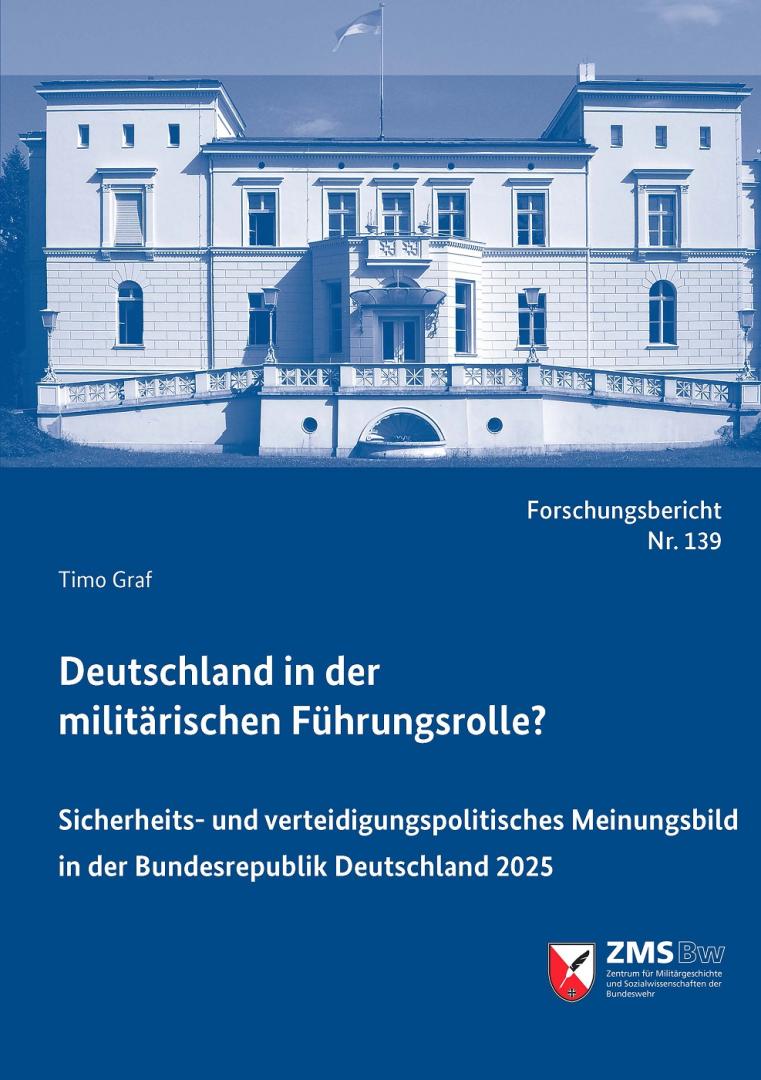Get the weekly SPARTANAT newsletter.
Your bonus: the free E-Book from SPARTANAT.

Russia continues its war of aggression against Ukraine unabated, while confidence in the alliance partner USA is dwindling. How does the German population respond to this double challenge? Answers to questions regarding threat perception, transatlantic relations, and military readiness in Germany are provided by the annual population survey of the Center for Military History and Social Sciences of the Bundeswehr (ZMSBw). Over 2,000 randomly selected citizens participated in the representative survey conducted from April 11 to May 17, 2025.

Majority Sees Russia as a Threat
Two-thirds of the population perceive Russia as a threat to Germany's security. Fear of Russian cyberattacks and the rearmament of the Russian armed forces has increased. This feeling of threat is similarly pronounced across all groups in the German population: Even respondents with a voting preference for the AfD or the Left predominantly view Russia as a threat. The tensions between the West and Russia are now considered the second-largest threat to their personal security by respondents - after inflation, but ahead of immigration to Germany.
Trust in the Alliance Partner USA Dwindles
The formerly strong trust of the German population in the USA as a reliable (alliance) partner has significantly decreased by 21 percentage points since Donald Trump's reelection as US President in comparison to 2024, now standing at 41 percent. Only 37 percent of respondents see the USA fundamentally as a reliable partner. This represents a loss of 28 percentage points and the largest change in attitude compared to the previous year. A relative majority perceives the foreign and security policy of the USA as a danger to cohesion within NATO. Although trust in the USA as a NATO partner is currently suffering, a majority of citizens do not wish to forgo military support from the USA.
Support for Defense Capability Grows
In this threatening situation, the financial and personnel strengthening of the Bundeswehr is receiving increasing support: Never before have more citizens advocated for an increase in defense spending (64 percent; +7 percentage points compared to 2024) and for a personnel increase in the Bundeswehr (65 percent; +7 percentage points). The strengthening of the Bundeswehr is endorsed by a majority in all examined groups within the population. Only a small minority advocates for a reduction in defense spending (8 percent) and troop levels in the Bundeswehr (7 percent), while a quarter each (24 percent; -6 percentage points) calls for a maintenance of the current level. An unchanged large majority of society, more than 80 percent, has a positive attitude towards the Bundeswehr, expresses its trust, and evaluates the relationship between the Bundeswehr and society positively. "The strengthening of the Bundeswehr and the national defense capability is a societal consensus," says Dr. Timo Graf, head of the population survey.
The introduction of a new military service for young people also receives majority support in the population. Compared to the previous year, acceptance has also increased among those aged 16 to 29, and a relative majority in this group now considers the introduction necessary. A large part of the population under 50 years also states that they would be willing to defend the country with a weapon in the event of a military attack: Among men, the value for personal defense readiness is 54 percent, while for women it is 21 percent. It becomes clear that "the citizens are not only demanding a strengthening of the Bundeswehr through an increase in defense spending, but are also willing to engage personally in military service," says Dr. Graf.
NATO and EU More Important Than Ever
Despite the massive loss of trust in the alliance partner USA, the majority of respondents clearly affirm their commitment to NATO's collective defense. Compared to the previous year, support for NATO's collective defense has further increased, particularly regarding a military leadership role for Germany. The already positive perception of EU defense cooperation has also significantly improved. An absolute majority of respondents supports a common European security and defense policy, financial support for European arms projects, the EU's role as an independent security and defense actor, and a joint European army. Public support for a military leadership role for Germany in the EU has also risen significantly (44 percent; +7 percentage points; rejection: 27 percent; mixed views: 26 percent).
Conclusion
Public support in Germany for an ambitious German defense policy and a military leadership role for Germany in NATO and the EU has increased compared to the previous year and is stronger than ever. The majority of citizens feel militarily threatened by Russia, and many have lost trust in the USA as a reliable NATO alliance partner since President Trump's inauguration - but not in NATO and European partners. This double challenge to the security of Europe and Germany should, according to a large majority of the German population, be met by a twofold strengthening of its own defense capability: on the one hand through the financial and personnel strengthening of the Bundeswehr, and on the other through even stronger defensive cooperation within NATO and the EU.
Author
Dr. Timo Graf researches public opinion on security and defense policy as well as civil-military relations in Germany. Dr. Graf leads the annual ZMSBw population survey and is the author of the research report.
About the Study
The annual ZMSBw population survey has been a gauge for the societal legitimation, relevance, and integration of the armed forces since the study began in 1996. Its results serve to analyze the relationship between the Bundeswehr and society as well as evaluate the Bundeswehr's public relations work (departmental research). Through the publicly significant publication of the survey results in various product formats (research reports, magazine and web articles, monographs, edited volume contributions, podcasts, public lectures, interviews), the ZMSBw makes an important contribution to understanding German security and defense policy (knowledge transfer). Furthermore, the survey data is processed in scientific publications, used as a basis for social science qualification work and in university teaching, and made available to research in the GESIS data archive (fundamental research).
You can find more detailed information about the study with numbers, methodology, and a download on the ZMSBw website.
SPARTANAT is the online magazine for Military News, Tactical Life, Gear & Reviews.
Send us your news: [email protected]
Ad
similar
Get the weekly SPARTANAT newsletter.
Your bonus: the free E-Book from SPARTANAT.


